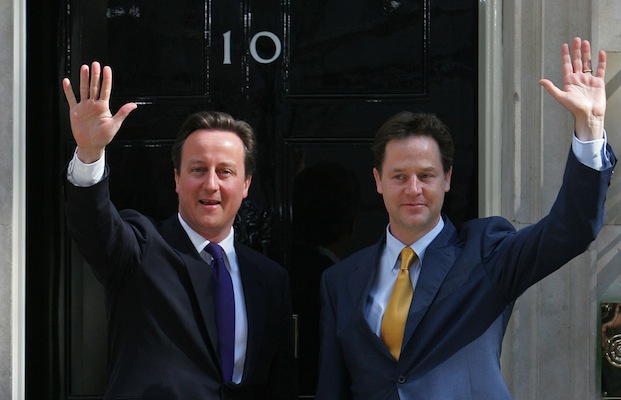Tories in Downing Street have concluded that they cannot rely on the support of any Liberal Democrats who are not ministers after the General Election, Coffee House has learned.
Even though most talk of how a Tory-Lib Dem coalition would work focuses on the number of seats each party would win, I understand that the Conservatives are now working on the basis that a coalition majority could only include those Lib Dems who are on the government payroll. Most forecasts currently put the Lib Dems on around 25 seats, and the Conservatives expect that this would lead to 10 of those MPs being appointed ministers.
The reason Number 10 has cut the number of Lib Dems available to form a government is that Nick Clegg’s backbenchers are becoming steadily more rebellious, and those who have been appointed parliamentary private secretaries to ministers (which is normally a way of ensuring loyalty from a greater number of backbenchers) have developed a habit of resigning to rebel against the government. Most recently, Tessa Munt resigned as PPS to Vince Cable after rebelling on fracking in the Commons. Before Christmas, Stephen Lloyd resigned as a PPS to Ed Davey over a road in his constituency in the best definition of a resignation aimed at bolstering a majority. Munt was replaced by Ian Swales, who will presumably be able to resist resigning given he is standing down at the General Election.
Those Lib Dem MPs who do remain after the General Election will be holding on to tiny majorities and will be desperate to do anything they can to bolster their constituency support. Many MPs today conclude that being rebellious, or getting a government job that you can resign from, is the best way of appealing to your constituents, even if it makes for rather frosty relations with the whips.
This means that though a Lib-Con coalition might appear to add up to a majority, it could in reality be a few MPs short when it comes to actual votes. So even if it appears possible to pass legislation, the government may struggle to do so regularly.
And this brings into play another group of rebellious MPs. If the Conservatives cannot rely on the wholehearted support of their coalition partners, they’ll also find that their ‘bastards’, the troublemaking backbenchers who like tabling awkward Commons votes, become very powerful indeed. Relying on these rebels has always been David Cameron’s nightmare scenario, but it is one that Number 10 thinkers are currently considering within a Coalition, rather than minority government, context.
 Join us on 23 March for a Spectator discussion on whether the era of stable government is over with Matthew Parris, James Forsyth, Jeremy Browne MP, Vernon Bogdanor and Matthew Goodwin. The event will be chaired by Andrew Neil. In association with Seven Investment Management. For tickets and further information click here.
Join us on 23 March for a Spectator discussion on whether the era of stable government is over with Matthew Parris, James Forsyth, Jeremy Browne MP, Vernon Bogdanor and Matthew Goodwin. The event will be chaired by Andrew Neil. In association with Seven Investment Management. For tickets and further information click here.







Comments